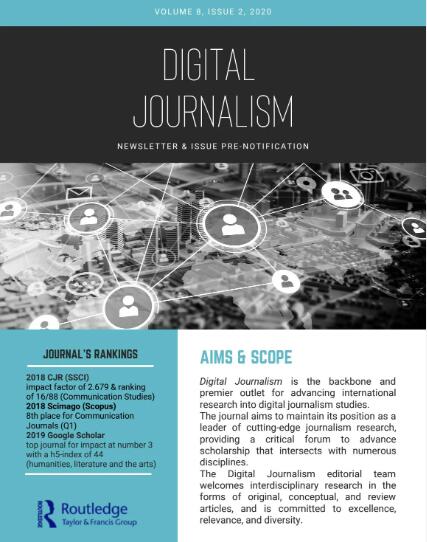脸书和谷歌关心新闻业吗?绘制GNI和FJP工具与新闻规范之间的关系
IF 5.2
1区 文学
Q1 COMMUNICATION
引用次数: 2
摘要
摘要本研究对脸书和谷歌进行了社会技术分析,以了解这些公司在商业模式下努力吸引记者的物质手段。通过可供性理论,我们认为技术工件的界面是其隐含政治和意识形态的表现,因为可供性包含了关于用户应该做什么的规范性声明。我们的研究借鉴了谷歌新闻倡议和脸书新闻项目来探索:FJP和GNI工具的可供性是如何允许特定行为并鼓励某些新闻规范出现的?我们通过进行话语界面分析,分析了FJP和GNI的九个面向记者的工具。研究结果表明,FJP和GNI工具的可供性可以鼓励四种不同的新闻规范:(1)成功的新闻业应该在平台上广泛传播,(3)成功的新闻业应该吸引平台定义的忠实读者;(4)成功的记者应该通过平台赚钱。我们认为,FJP和GNI工具的可供性可以促进一种平台教育形式,除了新闻学校和工作环境之外,它还可以决定什么是“成功的新闻”,什么不是“成功的”本文章由计算机程序翻译,如有差异,请以英文原文为准。
Do Facebook and Google Care about Journalism? Mapping the Relationship between Affordances of GNI and FJP Tools and Journalistic Norms
Abstract This study engages in a sociotechnical analysis of Facebook and Google to understand the material means by which these corporations strive to engage journalists vis-à-vis their business models. Through affordance theory, we argue that interfaces of technological artifacts are manifestations of their implicit politics and ideology, given that affordances entail normative claims about what users should do. Our study draws from Google News Initiative and Facebook Journalism Project to explore: how the affordances of FJP and GNI tools allow particular behaviors and encourage certain journalistic norms to emerge? We analyzed nine journalist-oriented tools from FJP and GNI, by performing a discursive interface analysis. Findings indicate that FJP and GNI tools affordances can encourage four distinct journalistic norms: (1) successful journalism should circulate widely on platforms, (2) successful journalism should be aware of the ways competition is measured in FJP and GNI, (3) successful journalism should attract loyal readership as defined by platforms and (4) successful journalism should make money through platforms. We argue that FJP and GNI tools affordances can facilitate a form of platform schooling which, in addition to journalism schools and work environments, can might dictate what is and what is not “successful journalism.”
求助全文
通过发布文献求助,成功后即可免费获取论文全文。
去求助
来源期刊

Digital Journalism
COMMUNICATION-
CiteScore
11.20
自引率
24.10%
发文量
103
期刊介绍:
Digital Journalism provides a critical forum for scholarly discussion, analysis and responses to the wide ranging implications of digital technologies, along with economic, political and cultural developments, for the practice and study of journalism. Radical shifts in journalism are changing every aspect of the production, content and reception of news; and at a dramatic pace which has transformed ‘new media’ into ‘legacy media’ in barely a decade. These crucial changes challenge traditional assumptions in journalism practice, scholarship and education, make definitional boundaries fluid and require reassessment of even the most fundamental questions such as "What is journalism?" and "Who is a journalist?" Digital Journalism pursues a significant and exciting editorial agenda including: Digital media and the future of journalism; Social media as sources and drivers of news; The changing ‘places’ and ‘spaces’ of news production and consumption in the context of digital media; News on the move and mobile telephony; The personalisation of news; Business models for funding digital journalism in the digital economy; Developments in data journalism and data visualisation; New research methods to analyse and explore digital journalism; Hyperlocalism and new understandings of community journalism; Changing relationships between journalists, sources and audiences; Citizen and participatory journalism; Machine written news and the automation of journalism; The history and evolution of online journalism; Changing journalism ethics in a digital setting; New challenges and directions for journalism education and training; Digital journalism, protest and democracy; Journalists’ changing role perceptions; Wikileaks and novel forms of investigative journalism.
 求助内容:
求助内容: 应助结果提醒方式:
应助结果提醒方式:


